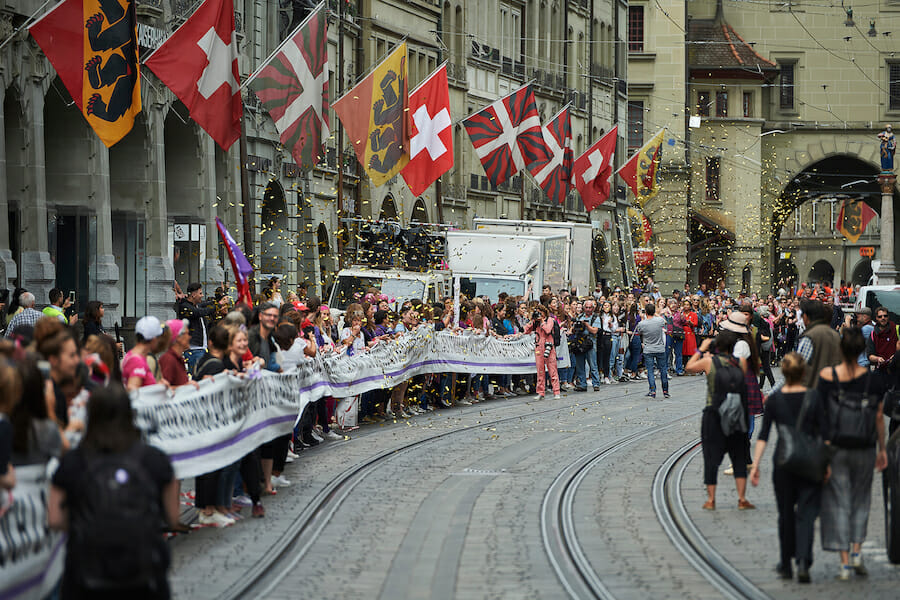
Switzerland Needs to Do Better on Gender Equality
On June 14, 2019, women made history in Switzerland. Thousands of women joined a general strike to highlight several issues, including the underrepresentation of women, the gender wage gap, and discrimination. Despite Switzerland being a very developed country, Swiss women only won their right to vote in 1971. In 1991, twenty years after attaining suffrage, half a million Swiss women took to the streets to demand more action for equal rights between men and women. At the time, there were no women in government, and there was no policy on maternity leave. It was only in 2005, that women gained the right of 98 days of paid maternity leave, after four failed attempts. As a result, Switzerland lacks gender equality compared to other developed countries. According to the World Economic Forum, Switzerland ranks 20th in gender equality, lagging behind many European countries, such as the Scandinavian countries, France, Germany, and Poland. Much like an Alpine climb, the feminist movement in Switzerland has been a long and challenging endeavor.
Equal pay for the same work performed is a constitutional requirement in Switzerland. However, according to the most recent data from the country’s Federal Statistics Office (FSO), women made almost 20 percent less in the private sector and nearly 17 percent less in the public sector compared to their male counterparts. By comparison, a report from the Organization for Economic Co-operation and Development (OECD) shows that the pay gap is around 13.6 percent across developed countries; therefore, the Swiss gap is more significant. The FSO also reported that the differences between the sexes are still visible when comparing the median gross salary in full-time jobs. For self-employed persons that perform the same position, men earned an average of 80,000 Swiss Francs (CHF), while women earned only 56,700 CHF. As employees, men made 85,200 CHF on average last year, compared to 71,500 CHF for women.
#unicare @uniglobalunion: Women Strike in Switzerland. My union @UniaSuisse is figthing for example with care workers for better staffing levels, equal pay, respect and time. Thousand women on streets. Amazing day! pic.twitter.com/mKWVURwljx
— Adrian Durtschi (@adriandurtschi) June 14, 2019
The latest Swiss Labour Force Survey shows that two-thirds of workers who have a low salary are women; furthermore, half of the women are foreigners. The report also revealed that the youth unemployment rate of women rose from 4.8 percent to 5.1 percent. In 2018, the activity rate of women aged 15 to 64 (79.9 percent) was 8.6 percentage points lower than that of men (88.5 percent). The OECD report on gender shows that 82 percent of men in Switzerland work full-time, compared to only 41 percent of women; whereas 11 percent of men and 35 percent of women work part-time. The same survey analyzed managerial positions in Switzerland, in which men occupy 64 percent. One factor that contributes to the pay gap is gender stereotyping of jobs, meaning that either a man or a woman is a better “fit” for a given job. Although it is not valid, such stereotypes may be dominant because they can bias a whole host of employment outcomes.
In June 2019, UNICEF released a report that portrays Switzerland as the least family-friendly country in Europe, with other poor performers including Greece, Cyprus, and the United Kingdom. The report outlines policies that make life hard for families in Switzerland. For example, the country offers the shortest paid maternity leave in Europe and one of the lowest in the OECD. Furthermore, Switzerland is also one of a handful of countries to offer no paid leave for fathers. In 2004, 75 percent of Swiss mothers worked part-time out of necessity to cover childcare, which the OECD said would hinder their career progression.
Swiss women strike for equal pay – again.
Nearly 30 years after staging a first nationwide strike for equal pay, women across Switzerland say they are preparing fresh actionhttps://t.co/5cpIiZFJAD pic.twitter.com/DAlULvO2ZS
— AFP news agency (@AFP) June 4, 2019
Although there has been some progress on women’s rights in Switzerland, violence, and harassment against women remains high and is one of the reasons why women went on strike. Amnesty International released a survey that showed that 22 percent of Swiss women aged sixteen or older have been subjected to non-consensual sexual relations. Furthermore, 59 percent of women have experienced sexual harassment in the form of unwanted contact, including hugging or kissing. Women are more likely than men to be victims of other more prevalent types of domestic violence. In the past ten years, an average of 25 people have been killed annually as a result of domestic violence in Switzerland, with 75 percent of the victims being women or girls. Around half of those women who were affected by violence and harassment against themselves had not talked about their sexual violence experience, and only 8 percent had filed a complaint with the police.
Switzerland has somewhat improved its gender equality in political representation in the past 20 years. In the Federal Council, 43 percent are women; in the National Council, 32 percent are women; and in the State’s Council, 15 percent. It is critical that there is a push so that the Swiss population could have a meaningful number of women in the parliament. Switzerland needs to develop a comprehensive national gender strategy. The introduction of gender quotas in politics in Switzerland can lead to more balanced gender representation and bring improvements in childcare and schooling policies. Childcare is an expensive business in Switzerland, an average child daycare costs 40 CHF, hindering the possibilities of both parents working full time. Therefore, many women opt out to work part-time in order to take care of their children.
Work, politics, discrimination, wages—the differences between women and men in Switzerland are still worthy of attention. If Switzerland wants to maintain its high quality-of-life standards by being one of the best places to live and work overseas, it needs to address the gender gap and reduce gender inequality. Public initiatives demonstrate the urge for changes. To achieve de facto equality, Switzerland needs to address underrepresentation in political decision-making entities, unequal pay, violence against girls and women, and disproportionate employment rates.

